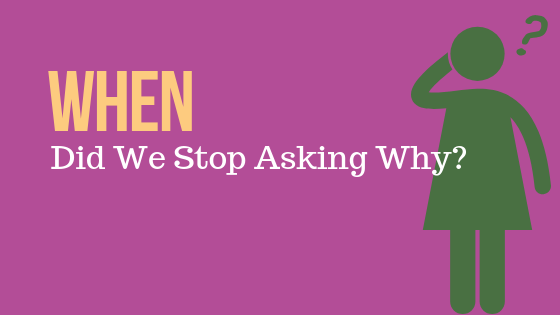“C’mon honey, it’s time to put on your shoes.”
“Why?”
“Because it’s time to get going.”
“Why?”
“Because we have an appointment in 20 minutes.”
“Why?”
“Because that’s the time that worked best in my schedule.”
“Why?”
“Because I had meetings this morning.”
“Why?”
“Because that’s when they were scheduled for.”
I’ll bet you can guess what comes next! If you’ve ever been around a toddler, you know this scenario all too well. That feeling of your blood pressure rising as you frantically try to think one step ahead of them, wondering what you could possibly say to stop the cycle.
Gradually, kids shift from thinking you have all the answers to knowing they have all the answers, and they communicate solely in grunts and eyerolls with the occasional “I know” thrown in, but what really happens along the way? Do they lose their curiosity, or do they learn to recognize the exasperated looks they see on our faces and just stop asking? At what age do we stop asking why?
Written by: Tara Luther, PRomega
In an article with Huffington Post, Vicki Cobb, President of iNK Think Tank, Inc., suggests that an emphasis in standardized testing has changed the culture of schools from thinking about the material presented to presenting the correct response. Consequently, as students are presented with an answer from an authority figure, they are often satisfied and don’t ask follow-up questions.
But what happens when we stop asking why? Of course, we can’t revert to our toddler selves, but what opportunities are we missing by simply accepting the status quo? In a field like forensic science, procedures are put in place for a very good reason, and not following them could lead to an undesirable outcome. Perhaps in a situation such as this, the better question to ask is why not?
ISHI 29 Keynote, Andrew Hessel, has been asking why not for much of his career. Focusing on cancer drug developments, he asked why not try a different approach? Why not allow create a non-profit, open-science drug development model to produce individually targeted drugs without mass-marketing? He turned to synthetic biology and is working on synthesizing the genomes of oncolytic viruses that are specifically designed to infect and lyse an individual’s tumor cells. Learn more about what Andrew is working on by watching our interview with him.
When Paul Holes, a former investigator with the Contra Costa County District Attorney’s Office, learned how genealogy was able to identify a young kidnapping victim using her DNA and a genealogy website, he asked why not apply the same methods to identifying the Golden State Killer? After uploading a fake profile to GEDmatch, and many, many hours spent by his team tracing back family trees, Joseph DeAngelo was arrested. (You can learn more about the Golden State Killer case by reading our interview with Paul in the upcoming issue of ISHI Magazine and by attending his Keynote presentation at ISHI 30 this September).
Inspired by the Golden State Killer case, ISHI exhibitors Parabon, Bode Technology, and DNA Labs International have begun offering genetic genealogy services. Since DeAngelo’s arrest, more than 50 other criminal cases have been solved using genealogy techniques.
Genealogy has also been used to identify John and Jane Does throughout the country. Margaret Press and Colleen Fitzpatrick teamed up to form the non-profit The DNA Doe Project to give identities back to the unnamed. Working with Doe cases often means working with degraded DNA. When they’ve had troubles extracting a usable DNA profile, they asked why not seek outside help to try a different method? As a non-profit, funding can be a challenge, so they asked why not crowdsource funding for cases important to the public? Within a few days of starting their “Doe Fund Me” campaign, they had enough funding for one of their cases. (For more on the DNA Doe Project, watch our interview below with Margaret and Colleen.)
What can you achieve by challenging the status quo and asking why not? You probably haven’t met Jerry, but he’s been a part of the ISHI team for years providing his A/V expertise behind the scenes. During our planning meeting in Palm Springs this past December, he ordered a piece of carrot cake for breakfast, declaring, “You only go around once,” and though we felt like we were breaking the rules, we all dug our forks in.
So, eat the carrot cake for breakfast, especially when it looks like that. I mean, not every day, because there’s a reason it’s ill-advised to eat carrot cake for breakfast, but sometimes you learn more by not following all the rules. What can you accomplish by asking why not?
WOULD YOU LIKE TO SEE MORE ARTICLES LIKE THIS? SUBSCRIBE TO THE ISHI BLOG BELOW!
SUBSCRIBE NOW!



